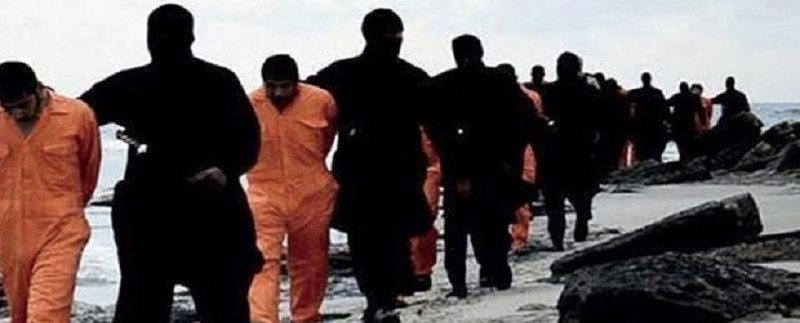
In response what they claim was the persecution of Muslims by the Coptic Christians in Egypt, Islamic State terrorists are believed to have beheaded 21 Egyptian Christians captured in Libya.
AINA News reports that on Friday, Twitter accounts linked to the Libyan branch of ISIS revealed disturbing photos captioned, "The Islamic State carrying out the execution of Coptic prisoners in the province of Tripoli."
In the first photo, five men wearing orange jumpsuits are shown kneeling while hooded militants armed with knives stand behind them,
The caption, written in English, further describes the prisoners as "the humiliated followers of the Coptic church".
The second photo, which was also published in Dabiq, an ISIS online magazine, shows more men wearing the orange jumpsuit, standing in a line behind their executors. The message alongside the image reads, "Revenge for the Muslim women persecuted by Coptic crusaders in Egypt".
While not officially confirmed, the purported death of the Coptic Christians, who were captured by ISIS in Sirte, on Libya's coast, in December and January, caused horror in the small Egyptian village of El Aor, home to many of the abductees. "It was a dark day in the village. Everyone was crying," Mina Thabet, from the Egyptian Commission for Rights and Freedoms, said.
As previously reported by the Gospel Herald, over the past several months, there have been demonstrations in Cairo by families calling for the release of the Coptic Christians, who are believed to have experienced "unspeakable torture" at the hands of their captors. However, Egypt claimed to have experienced problems making contact with the abductors. "There should have been more attempts by the government to intervene," Hanna Aziz, a fellow worker who escaped the Sirte kidnappings, said. "We are all Egyptians, regardless of our religion."
On Friday, the government in Egypt offered to evacuate thousands of its citizens out of Libya in response to the release of the photos.
"We are helping them," Cairo's foreign ministry spokesman, Badr Abdelatty, said. "If they would like to come back from Libya, we are facilitating their return to their home country."
Since the dismantling of the Gaddafi regime in 2011, Libya has been in a state of disarray. The region faced a civil war, splintering Libya between an internationally recognized government in the far east and Islamists who control Tripoli in the west.
Egyptian Coptic Christians, many of whom work in Libya, are frequently targeted by the Islamic extremists, who wish to establish a caliphate, or state ruled by Sharia law, throughout the region.
In December, a 13-year-old girl was abducted and killed by armed men in what is believed to be a religiously motivated attack. In February last year, the bodies of seven Egyptian Christians who had been shot were found near Libya's second largest city, Benghazi.
In January, the head of Libya's government pleaded for more help from the international community to fight the growing threat of Islamic extremism within the region.
"The international community classified Ansar al-Sharia as a terrorist organization and it is leading an international coalition to crush such groups in Iraq and Syria," Prime Minister Abdullah al-Thani said of the US-led alliance against the Islamic State group.
"But in Libya, the government and armed forces are battling these groups alone, without any support from the international community," he said.
"We are afraid that the groups that are in Syria and Iraq will infiltrate Libya if they (coalition forces) tighten the noose around them there."














